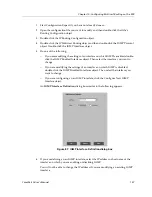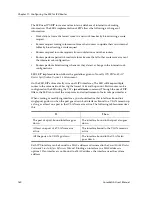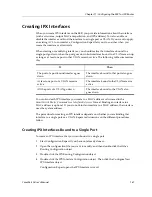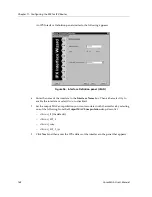
CoreWatch User’s Manual
155
Chapter 10: Configuring Multicast Routing on the SSR
On the SSR, IGMP can be configured on a per interface basis. You can configure an SSR
interface to support IGMP only or both IGMP and DVMRP. If an interface is configured
for both IGMP and DVMRP, IGMP starts and stops automatically with DVMRP.
On the SSR, IGMP keeps track of members on a per port basis even though an interface
might contain multiple ports. Ports belonging to an interface without any IGMP
memberships are not sent any multicast data traffic. This prevents ports from being sent
unnecessary multicast traffic. This optimization, however, is removed if a network has
multiple routers with multiple ports running a multicast protocol on a single interface.
The optimization is removed to allow interaction between any host and any router within
that interface. You can also remove this optimization on individual IGMP interfaces.
The SSR’s implementation of IGMP allows control of the following:
•
IGMP host-query intervals. Host queries are packets an IGMP router sends to hosts to
learn which hosts are available. Host queries help a router determine changes to host
membership.
A longer host query interval means less IGMP queries on the network. For hosts not
sending explicit messages about when they leave a group, the host query interval helps
the SSR determine when those hosts left that group.
•
Response time, which helps in controlling the burstiness of responses from the
multicasting hosts responding to IGMP queries from the SSR.
You can configure the host query interval and response time on the SSR because such
configurations are supported in IGMP version 2. In IGMP version 1, however, the query
interval is fixed at 125 seconds and response time is fixed at 10 seconds.
The SSR lets you control which groups are allowed or barred on a per-interface basis.
Configuring IGMP Interfaces on the SSR
You configure IGMP interfaces by
•
Setting IGMP global parameters that will apply to all ports.
•
Enabling or disabling IGMP on interfaces.
Setting IGMP Global Parameters
Configuration Expert lets you set some IGMP parameters that apply to all ports. These
global parameters specify how often the SSR sends queries to learn which hosts are
available and also how long the SSR waits for hosts to respond to such queries.
To set the global IGMP parameters that will apply to all ports:
1.
Start Configuration Expert if you have not already done so.
Summary of Contents for SSR-GLX19-02
Page 1: ...CoreWatch User s Manual 9032564 04...
Page 2: ...Notice 2 CoreWatch User s Manual...
Page 20: ...Preface 20 CoreWatch User s Manual...
Page 64: ...Chapter 5 Changing System Settings 64 CoreWatch User s Manual...
Page 86: ...Chapter 6 Configuring SSR Bridging 86 CoreWatch User s Manual...
Page 106: ...Chapter 7 Configuring VLANs on the SSR 106 CoreWatch User s Manual...
Page 206: ...Chapter 12 Configuring QoS on the SSR 206 CoreWatch User s Manual...
Page 246: ...Chapter 13 Configuring Security on the SSR 246 CoreWatch User s Manual...
Page 363: ...CoreWatch User s Manual 363 Chapter 16 Configuring Routing Policies on the SSR 9 Click OK...
Page 364: ...Chapter 16 Configuring Routing Policies on the SSR 364 CoreWatch User s Manual...
Page 370: ...Chapter 17 Checking System Status 370 CoreWatch User s Manual...
Page 390: ...Chapter 18 Monitoring Real Time Performance 390 CoreWatch User s Manual...
Page 396: ...Chapter 19 Checking the Status of Bridge Tables 396 CoreWatch User s Manual...
Page 430: ...Chapter 20 Checking the Status of Routing Tables 430 CoreWatch User s Manual...
Page 442: ...Chapter 22 Obtaining Reports 442 CoreWatch User s Manual...
Page 456: ...Appendix B CoreWatch Menus 456 CoreWatch User s Manual...
















































